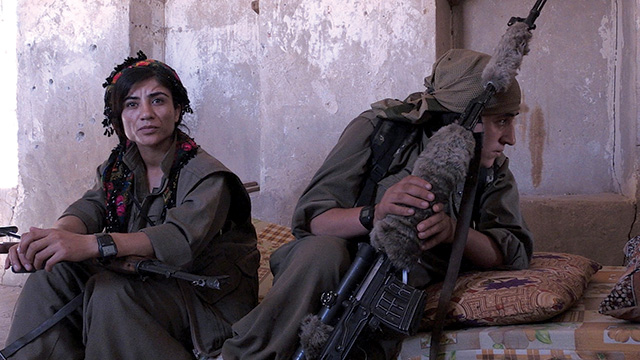A scene from Hell on Earth: The Fall of Syria and Rise of ISIS by Sebastian Junger and Nick Quested
Sebastian Junger and Hell on Earth
by Rebecca M. Alvin
It’s no surprise that in the past two years there have been a lot of documentaries about Syria released. Many are made by Syrian filmmakers themselves, such as the haunting first-person account of life in Aleppo at the start of the Syrian Civil War, Houses Without Doors (2016) by Avo Kaprealian. Others are made by western filmmakers connected to the region or working with Syrians, such as Last Men in Aleppo (2017) by Firas Fayyad and Steen Johannessen, City of Ghosts (2017) by Matthew Heineman, and After Spring (2016) by Steph Ching and Ellen Martinez. And earlier this year, three of the five nominees for Academy Awards in the documentary short category (The White Helmets, 4.1 Miles, and Watani: My Homeland) were about Syria. But no matter how many films are made about it, the conflict still seems so large and so complex that many of us find it hard to comprehend.

Journalist, author, and filmmaker Sebastian Junger and co-director Nick Quested give us a new film that lays out the origins of the conflict, as well as the genesis of ISIS. Hell on Earth: The Fall of Syria and the Rise of ISIS, which premiered at the Tribeca Film Festival this past April, will be screened in this year’s Provincetown International Film Festival, and Junger will also speak about his work and the film in a conversation moderated by journalist and author Mark Harris, former executive editor of Entertainment Weekly and author of Five Came Back. Speaking by phone on the way to the airport, as he’s currently touring with the film, Junger sets his film apart from the others. “Well, I haven’t seen any of them, but my understanding is that they all have specific stories they’re telling… Our film is certainly bigger in scope. It tries to explain the entire civil war and how ISIS came out of that situation, to put ISIS in a historical and moral context, and finally, to bring that situation in Syria back home to the streets of Paris and the streets of the cities of the western world in the form of terrorism,” he explains.
The film is an in-depth history of a situation that is constantly changing, but for the filmmakers, that moving target aspect was not as much of a challenge, as they were keenly focused on reporting how the situation came to be, regardless of how it eventually ends. “The film is about how the civil war started and why it started and how it produced ISIS. It’s not about how the civil war ended, which is probably the phase we’re in now,” Junger says, adding, “The sort of essential, enduring truths about war and about civil war, and about violence and religious extremism hold true whether the government takes Aleppo or not. I mean those sorts of tactical realities on the ground don’t really effect the larger message that much.”
Junger is clear that he did not go to Syria to shoot footage, but rather relied on others already there and in the surrounding areas where refugees have fled (roughly 50% of the Syrian population, according to the film). And yet, Hell on Earth manages to tell the story with an impressive set of interviews, with everyone from former National Security Advisor under President Trump, Michael Flynn, to a family of Syrian refugees in hiding who are eventually smuggled out, and an array of archaeologists, members of the Free Syrian Army, former heads of state in the Middle East, academics, and journalists.
One particularly surprising scene features female soldiers in the Kurdish army who explain their service is on a completely equal status with the men. It’s not often we see women’s involvement in the fight against terrorism in a part of the world where they are often denied equal rights under male dominated regimes. Junger points out, however, Kurdish fighters aside, regular women in the region have a major role even if it is in some respects traditional. “Mostly they’re trying to keep life going as it was before, as best they can. I mean they’re acting in their capacity, generally as mothers, in keeping society civil and stable and people alive and fed.” Junger says.
Hell on Earth is a difficult film at times. While never crossing the line into showing the full extent of the violence, it is hard to watch small children playing in the background as their father discusses beheadings and missing neighbors. Likewise, scenes of injured and even dead children are necessary in conveying the extreme horrors that come with terrorism. Of course, some of that has changed since the film was completed.
Specifically, Junger says, “I thought Trump’s missile strikes were in some ways a step in the right direction. I mean the idea that we could live in a world where despots could use chemical weapons against children without any reaction from the international community at all, without any repercussions, I think is horrifying. And you know, I didn’t vote for President Trump, and I disagree with him on virtually everything, but when he did that, I don’t know what his motivations were, but certainly the act itself, I thought, I’m glad something happened. I’m glad it wasn’t just nothing.” Junger admits this view is sometimes controversial, especially if you’re a “committed lefty,” as he describes himself. But, he explains, “It’s a position that has been produced by a decade and a half of war reporting, and actually being able to witness the startling effect of military force in stopping civil wars. I mean every single war that I have been in has been stopped or mitigated by use of military force by the West.”
Hell on Earth: The Fall of Syria and the Rise of ISIS will screen on Sunday, June 18, 2 p.m. at the Art House, 214 Commercial St., as part of the Provincetown International Film Festival. It will include a brief Q&A with Junger after the film. His conversation with journalist Mark Harris will take place on Saturday, June 17, 10 a.m. – 12 p.m. at the Provincetown Theater, 238 Bradford St., Provincetown. For tickets and information on both events, go to the festival box office in the Whaler’s Wharf mall, 237 Commercial St., Provincetown, or visit provincetownfilm.org.






